Batulo weaves through the crush of passengers streaming down the train station stairs.
It is loud – so loud. Suitcases rumble and announcements blare and no one seems to know which way to go.
But Batulo heads directly for the airport entrance. She watches the crowd thin as people pass through the sliding doors. Like a tide spreading across the sand, travelers scatter in every direction.
To many people, it looks like chaos. It did to Batulo the first time she arrived here a year ago. But now she sees things differently. She can already tell today will be quieter than usual at the world’s busiest airport.
The rhythms of this place have become as familiar to her as a verse in the Quran.
She gets in line at the employee entrance, a black bag slung over her shoulders, a bright pink pin on her hijab that says “#KEEPON.”
As she waits to pass through security, Batulo stands just a few feet from the spot where her world changed: the red line on the floor that says, “DO NOT ENTER.”
Lost and found
Batulo’s father, Abdalla, didn’t obey the warning.
The second he saw her, he sprinted past airport police. He ignored shouts to stop. He ran over the red line, swept Batulo off her feet and carried her across the arrivals lobby.
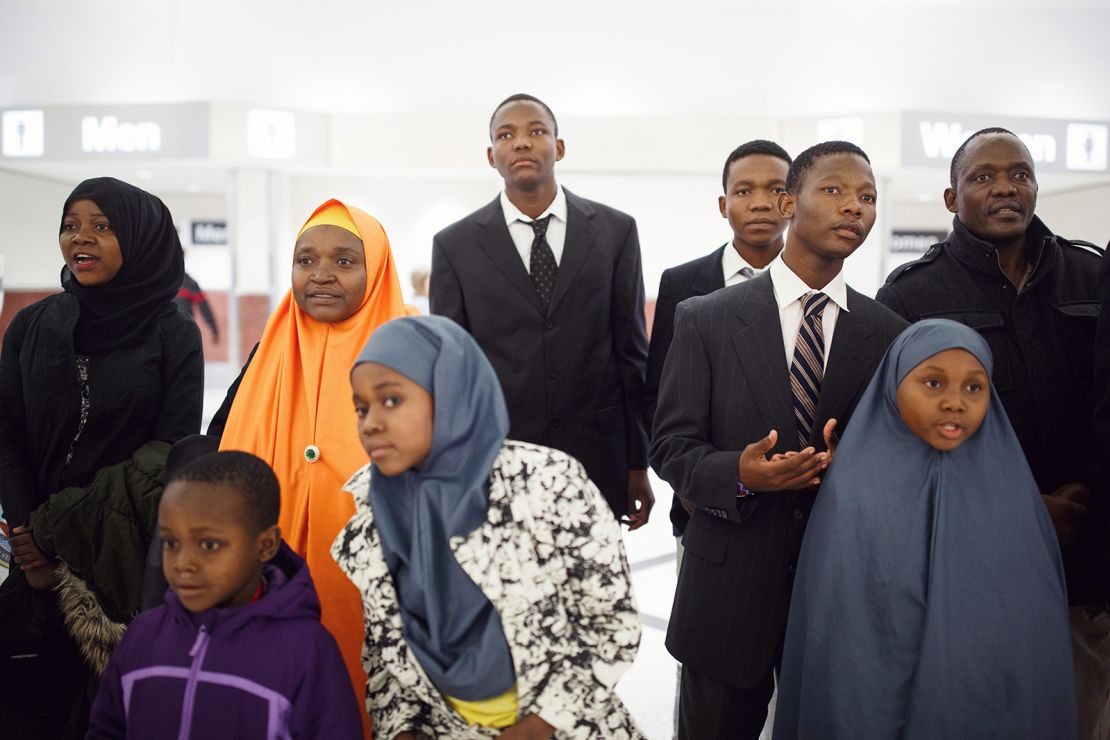
For weeks, Abdalla had been terrified he would never see his oldest daughter again. She was stranded and alone in a Kenyan refugee camp, where daily life was difficult and dangerous. He was here, thousands of miles away, unable to protect her.
Abdalla Ramadhan Munye and his wife, Habibo Mohamed, arrived in the United States days before Donald Trump’s inauguration. They had seven children in tow – two daughters, three sons and a niece and nephew they’d been raising for a decade. Batulo was supposed to follow about a week later.
But the Trump administration’s travel ban blocked her from boarding a flight to the United States.
For nearly a month, the Somali refugee family lived separate lives on separate continents, begging authorities to help them live together again. Court orders blocking the travel ban answered their prayers.
On a Wednesday night in February 2017, Batulo landed in Atlanta on an American Airlines flight.
It was supposed to be a joyous occasion.
But Batulo sobbed.
The airport was a maze of walkways, trains and signs she struggled to understand. When she couldn’t find her way, she began to cry.
A lanyard around her neck held an ID card from the International Organization for Migration.
“I am a refugee from SOMALIA,” the card read. “I may not speak English and need help to find my next flight.”
Batulo froze at the foot of the escalator, afraid to take her first step on a contraption she’d never seen.
A couple saw her struggling and helped her find her way. She never learned their names. She only remembers they were wearing blue.
A new journey begins
Challenges of life in the United States were sharp at first. It was winter, and the biting cold pricked their skin like needles. Strangers’ words were sometimes hard to understand. Even though Batulo and her family had found safety, they lived each day with fear for the friends and family they’d left behind.
Batulo’s oldest brother, Ramadhan, was still in Kakuma, the Kenyan refugee camp, waiting for the go-ahead to join his family in the United States. Would he ever get the chance, or would a new travel ban stop him from making the trip?
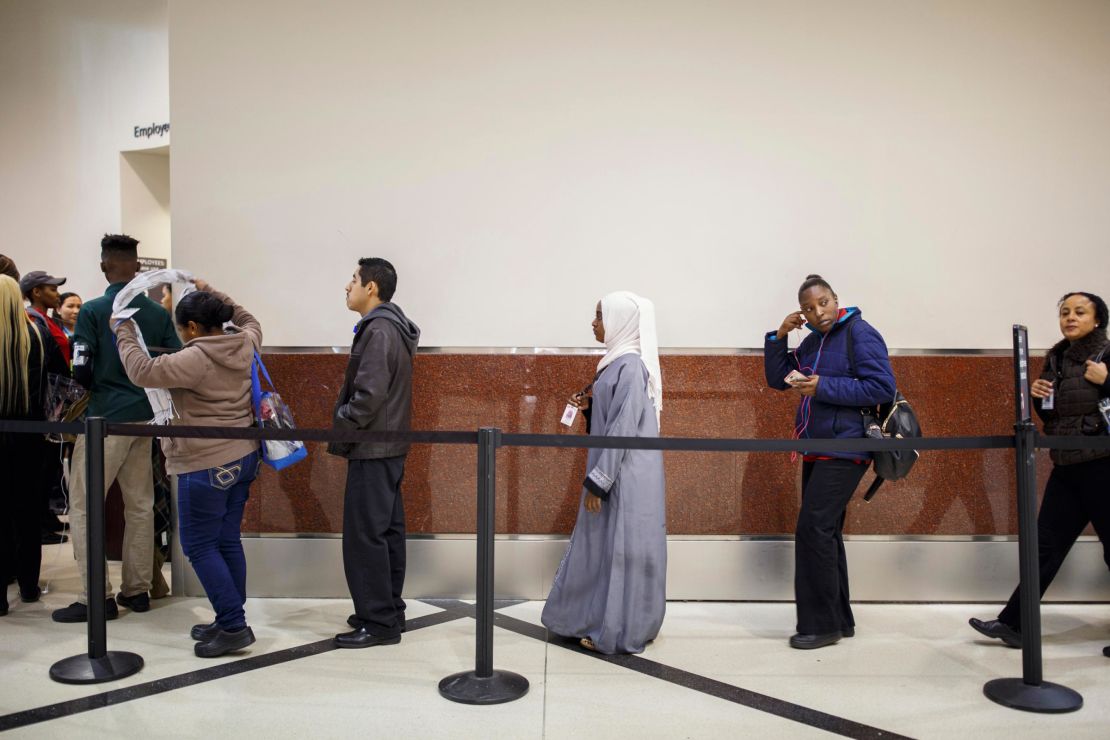
There was so much uncertainty, but as the days passed, there was less and less time to wallow and worry.
They had to improve their English. They had to find work. They had to learn to make it on their own.
It’s a well-worn path, traveled by more than 3 million refugees who’ve sought safety on US soil since 1975. But the journey has become far less frequent as the Trump administration increases immigration restrictions. In the year since Batulo arrived, about 26,000 refugees have resettled in the United States – nearly a 75% drop from the same time period the previous year.
For Batulo and her family, the stroke of a president’s pen rewrote the story of their lives for weeks. But that was more than a year ago.
Now new routines define their lives. They’ve found jobs at warehouses and chicken plants. The younger children study at a nearby elementary school. The older ones are taking GED classes at a technical college down the street. As they head to school or to work, they pass each other in the hallway of their three-bedroom apartment like gears cycling through a machine.
Batulo departed for the United States afraid of what she would find here. When she stepped onto a plane for her first flight, the Trump administration’s travel ban was the only thing she knew about America and its people.
Since then, there have been so many firsts. The first time Batulo saw snow. The first Ramadan feast in their new home. The first time an American man stood up on a crowded train and offered her a seat.
The United States was more welcoming than she expected.
But some of the firsts haven’t been easy.
A ‘first’ they didn’t expect
July 4 started well. Abdalla and his children took the bus to Walmart. His oldest son, Ramadhan, was finally about to arrive in America. The family wandered the brightly lit aisles and found chicken and fish to cook for a feast.
But back at the apartment, when darkness fell, something terrifying happened.
Abdalla heard sounds he never wanted to hear again.
Sounds he heard in another home, thousands of miles away.
By the numbers: How Batulo and her family fit in
Sounds he heard the day his oldest daughter was raped and killed.
Sounds he heard when his family fled.
Explosions. Gunfire. These are sounds you do not forget.
To Abdalla, it sounded like Somalia.
Only one explanation seemed possible: War had found his family here, too.
He yelled for his children. They closed the windows and slammed the front door shut. They ran to their bedrooms and turned out the lights.
Abdalla fumbled for his phone. In an orientation class after arriving here, he’d learned what to do in an emergency.
Call 911.
His son, Juma, told him to hold off.
“This is a celebration,” Juma said. The explosions weren’t gunfire or sounds of war, he told his father. They were fireworks.
Abdalla remembered something else he’d learned: that on July 4, Americans celebrate. But this, he thought, does not sound like a celebration. Even if it is, someone could hide in the commotion and attack.
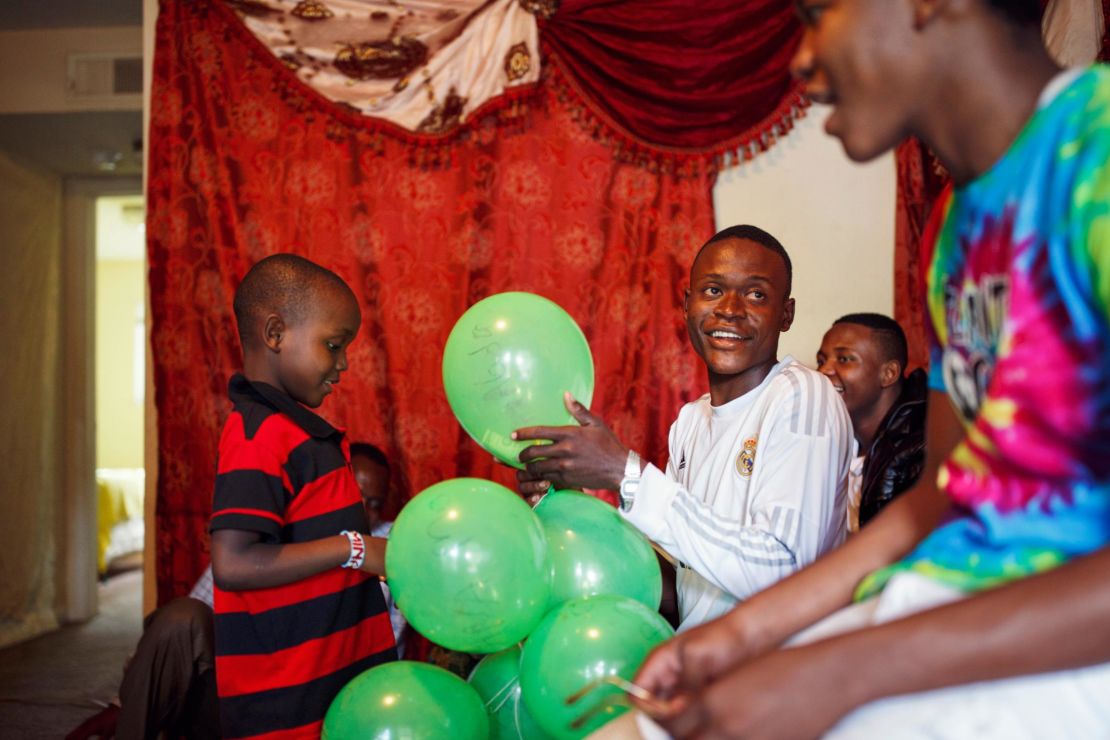
His family kept their front door closed, afraid to go outside, until morning.
It was their first Independence Day in America.
On the job
On Batulo’s first day of her first job, the words that spilled out of customers’ mouths sent her spinning.
In Kakuma, the Kenyan refugee camp where she had lived for nearly a decade, she sometimes helped her mother with sewing. But before coming to America, she never had a job of her own.
When Batulo arrived in the United States, she wanted to focus on her studies. She hopes to become a nurse someday, and she needs to get a GED before she can enroll in a college program.
But first, she has to earn enough money to help her family pay rent. And like all refugees, she has to pay back the cost of the flights that brought her to the United States.
So she asked for leads from the International Rescue Committee, the agency helping her family resettle in the United States. And a few months after her arrival, Batulo landed a job at a Dunkin’ Donuts at the Atlanta airport.
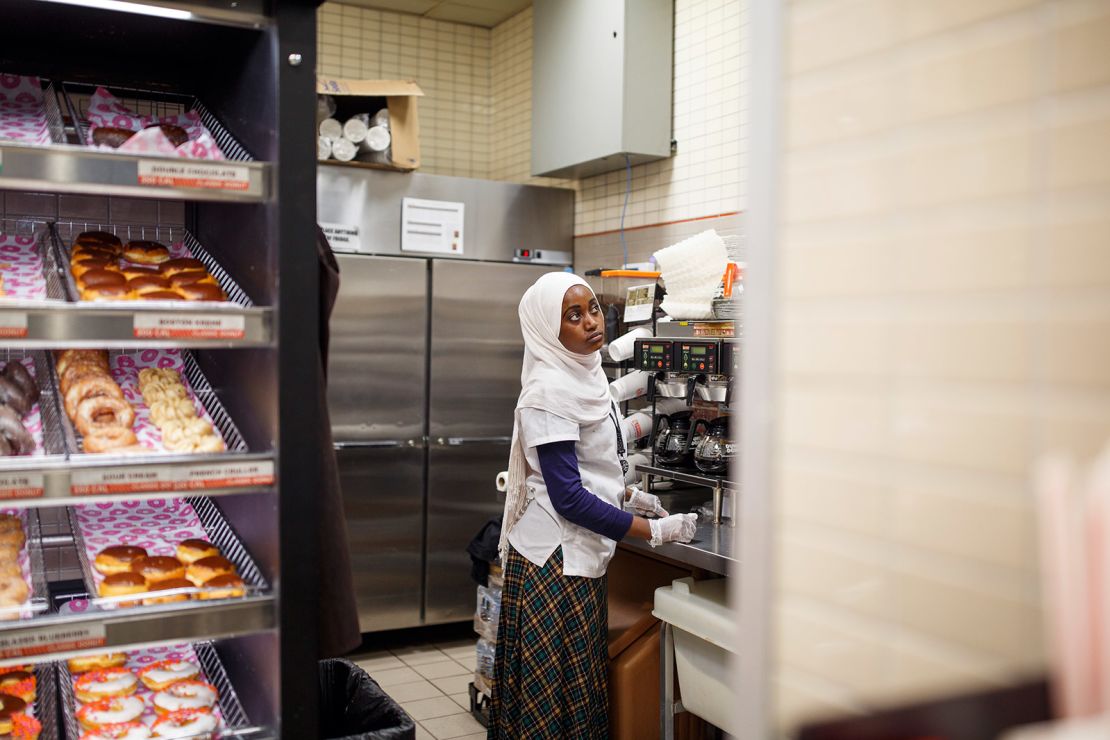
At first, Batulo bristled when customers asked for things she’d never heard of and glared at her when she didn’t grasp what they said at the speed of light. Sometimes, they didn’t seem to understand what she said, either.
“Nonfat milk,” one man said.
“Who’s fat?” Batulo replied.
Now, Batulo beams as she stands behind the Dunkin’ Donuts cash register. She wears a Delta Airlines pin on her lapel – a recent gift from a pilot.
When she says “Hello sir” and “What’ll you have, ma’am?” and “Please swipe your card for me,” her voice is so confident and clear that you can hear it above the rumble of the rolling trash bin, above the honk of the cart zooming by, above the announcement every few minutes that Atlanta, Georgia, is in the eastern time zone.
Sometimes, lost passengers stop and ask Batulo for directions. They don’t always speak English, but Batulo does her best to point the way.
The line of customers tapers off at times, but never disappears.
Blonde girls with their hair in ponytails and sparkles on their backpacks. An old man with a bright red bandana in his pocket. Pilots in uniform fueling up for the night.
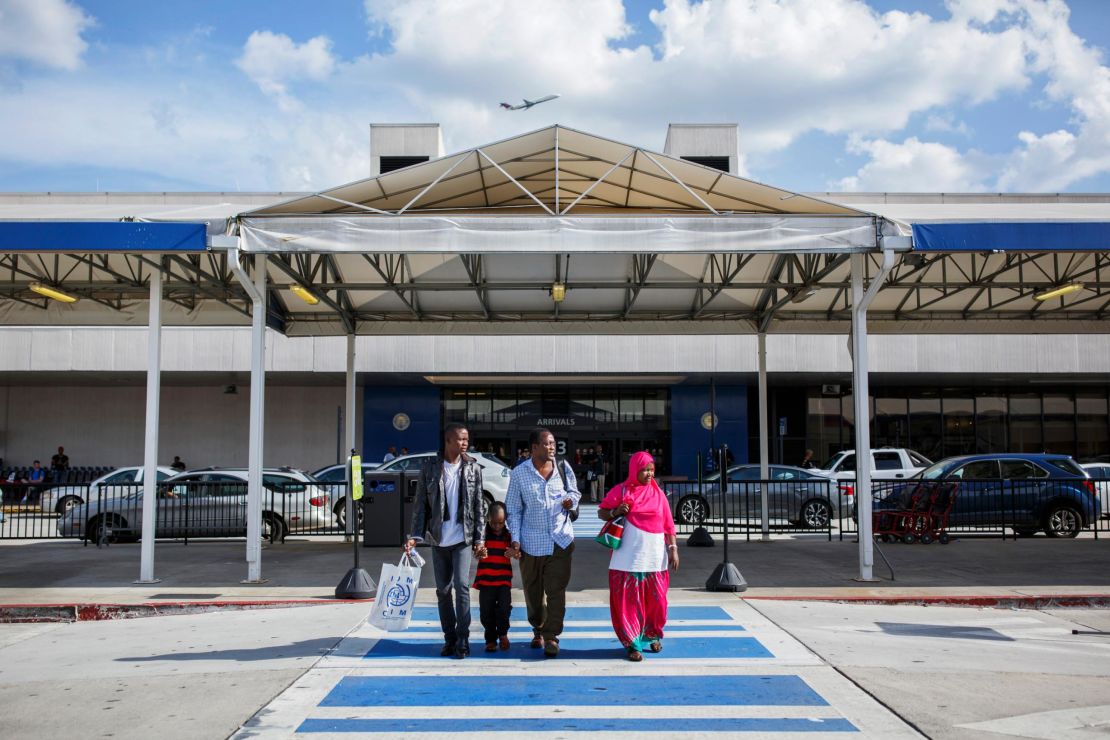
At the world’s busiest airport, there is always someone who needs a cup of coffee.
If anyone asks what to order, Batulo will tell them to try her favorite drink, vanilla chai.
While she works the register, she zips from station to station behind the counter. One minute, she makes a fresh pot of coffee. The next, she spins around and plucks a few donuts from the shelves.
She darts so quickly that the back of her hijab flutters behind her, like the hint of a superhero’s cape.
A devastating message
Abdalla stares at a photo on his cell phone screen, searching for signs of something familiar.
A man wearing a surgical mask stands hunched over a wheelbarrow, surrounded by rubble.
Abdalla and his family are more than 8,000 miles away from the war-torn land they fled, but it is always close.
The man in the photo is Abdalla’s father, standing on a street in Mogadishu.
The photo shows him helping the Red Cross clean up the wreckage from a bombing that killed hundreds of people. Just a few feet from his father, there’s something that looks pink – it’s human flesh, Abdalla says. The October truck bombing in Somalia’s capital tore people apart. Abdalla’s father is picking up the pieces: hands and legs strewn across a city block.
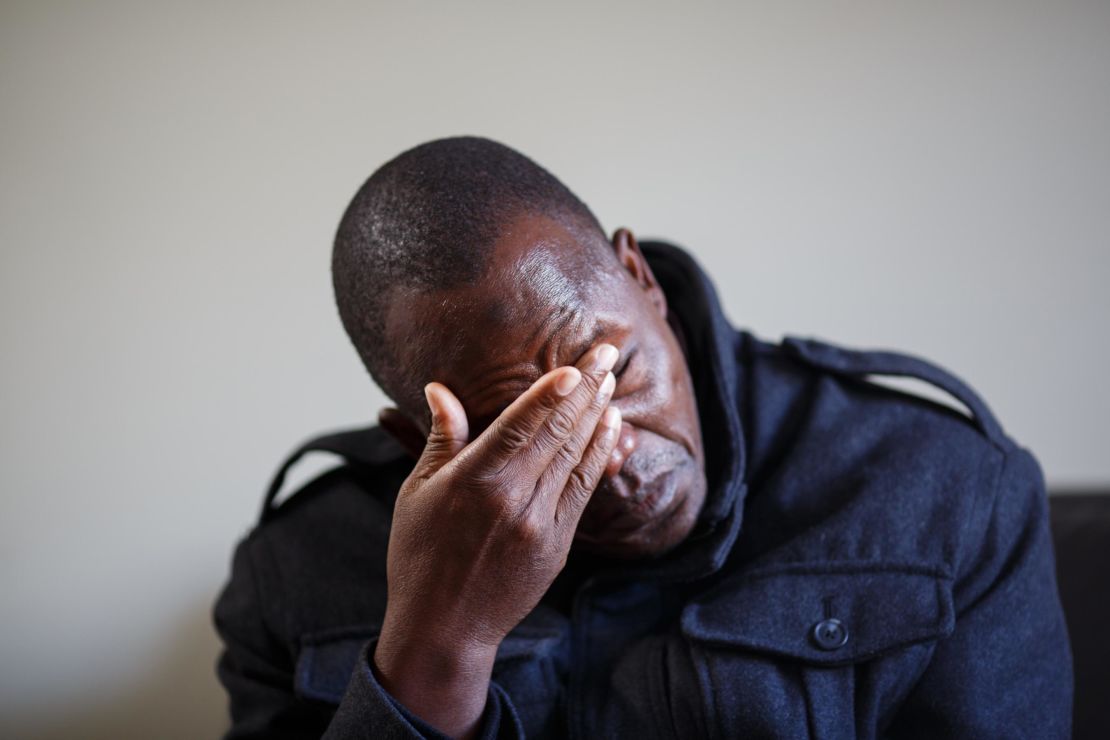
For years, Abdalla didn’t know whether his father was dead or alive. As war spread in Somalia, communicating with family there became increasingly difficult.
It was a relief when they recently reconnected for the first time in nearly a decade. They use a cell phone app to send each other photos and voice messages. For Abdalla, it’s hard to hear his father’s description of the place he once called home: “Somalia has become a bad country. It’s no good. So don’t even try to live your life here.”
It’s even harder to see his father suffering and know there’s nothing he can do to help.
Life lessons
Batulo furrows her brow as she stares down at the notebook in front of her.
Math usually comes easily to her. But there’s one problem on the worksheet her teacher handed out that simply doesn’t make sense.
Batulo raises her hand.
“What about Number 7?” she asks.
“A school band has 480 boxes of popcorn to deliver. The booster club has offered to deliver 1/3 of the boxes. The cheerleaders will deliver 1/4 of the boxes. What fraction of boxes will the members of the band deliver?”
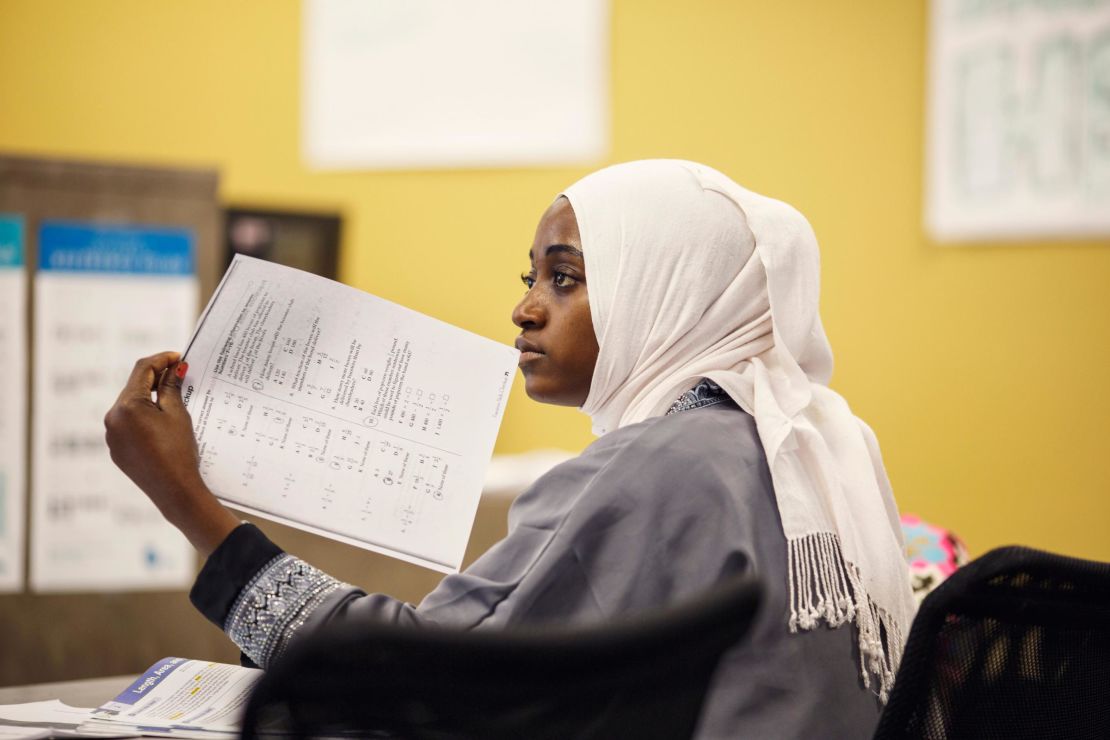
Keenan Slaughter looks out at the GED class at Georgia Piedmont Technical College and realizes the problem his students are having with the math worksheet has very little to do with numbers.
“Do you understand the situation?” the math professor says.
Rows full of refugees look back at him with blank stares.
Slaughter explains that school bands give students the chance to play musical instruments. Sometimes they sell popcorn, he says, to raise money for things like uniforms and travel.
“Are you familiar with the concept of what a booster club is?” Slaughter asks the class.
Batulo is quick to answer “no.” This is the first time she’s heard that phrase.
“They promote school spirit,” Slaughter says.
There were no bands or booster clubs at Batulo’s school in Kakuma.
Last week, she got a text message from a friend there.
“Life is becoming hard,” he told her. Schools have started to charge for classes. He has to drop out. He can’t afford to pay.
Game changer
Abdalla presses a button in his pocket.
Beep-beep.
The doors to his 2005 Toyota Sienna minivan open. His oldest son sits beside him. His wife and several children climb into the back rows.
Abdalla starts the engine and backs slowly out of the parking space. He drives so slowly through the apartment complex that, at times, it seems like the car is barely moving. When he reaches a traffic light, the car lurches to a stop.
A tree-shaped “Black Ice” air freshener dangles from the rearview mirror. A bumper sticker on the back of the car says, “I’m a proud parent of a Kiwanis Terrific Kid!”
He bought this van for $2,500 a few weeks ago from a nearby used car dealership. It’s old. The check engine light won’t turn off. And Abdalla is scared to drive at night or on the highways.
But he knows this vehicle will be a game changer. Eventually, he might drive it to work, or to visit his son’s school.
For now, he’s just using it for short trips.
Other than trains and buses, this is the family’s only way to get around. They had two bicycles, but no locks. Both bikes were stolen from their front porch.
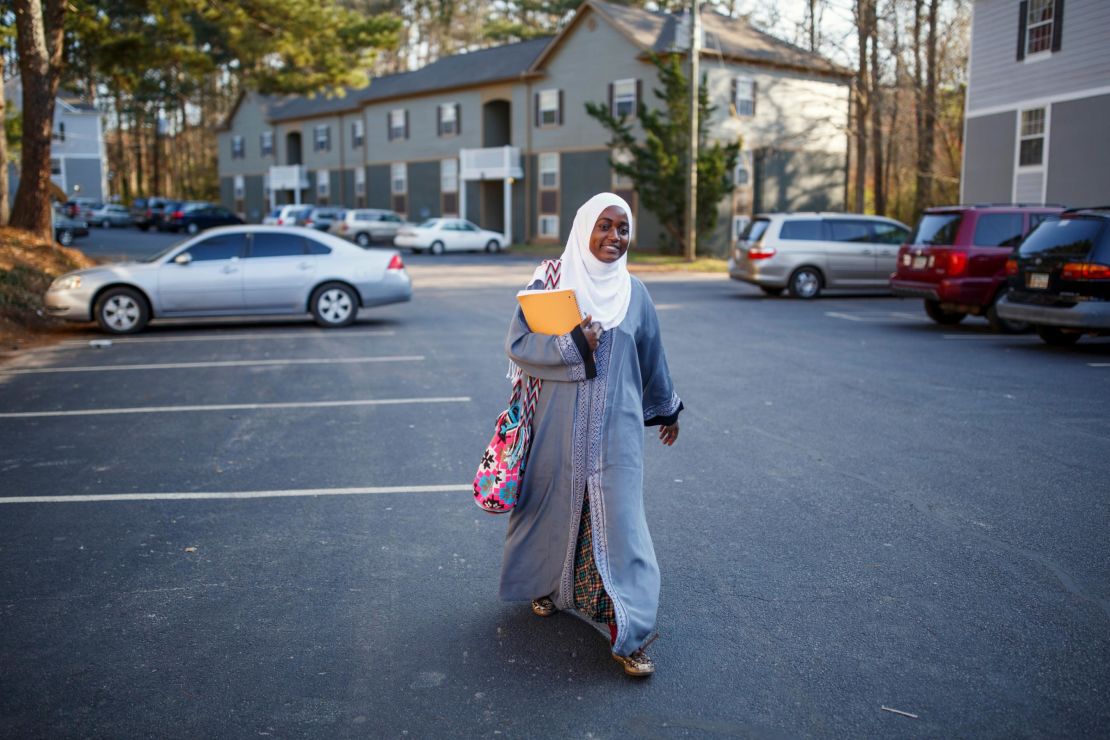
For months, Abdalla tried to pass a driving test.
He failed so many time he lost count. Then, finally, he passed.
Memories and a memorial
Batulo puts on her backpack and rushes out the door of her apartment.
It’s February 15, the one-year anniversary of her arrival in the United States. That means she’s eligible for a green card. She has an appointment to begin the application process, and she doesn’t want to be late.
As she heads to the bus stop, Batulo walks on the narrow strip of dirt between the curb and the concrete. She prefers feeling the earth under her feet. It makes her think of Kakuma.
An ambulance zooms by.
She rode in one for the first time a few months ago. She had to be rushed to the hospital after falling ill from a milk allergy.
That day, for a moment, she worried she was going to die.
In her first year in America, she has seen accidents and sickness – but nothing like Kakuma. There, it seemed like six or seven people died every day.
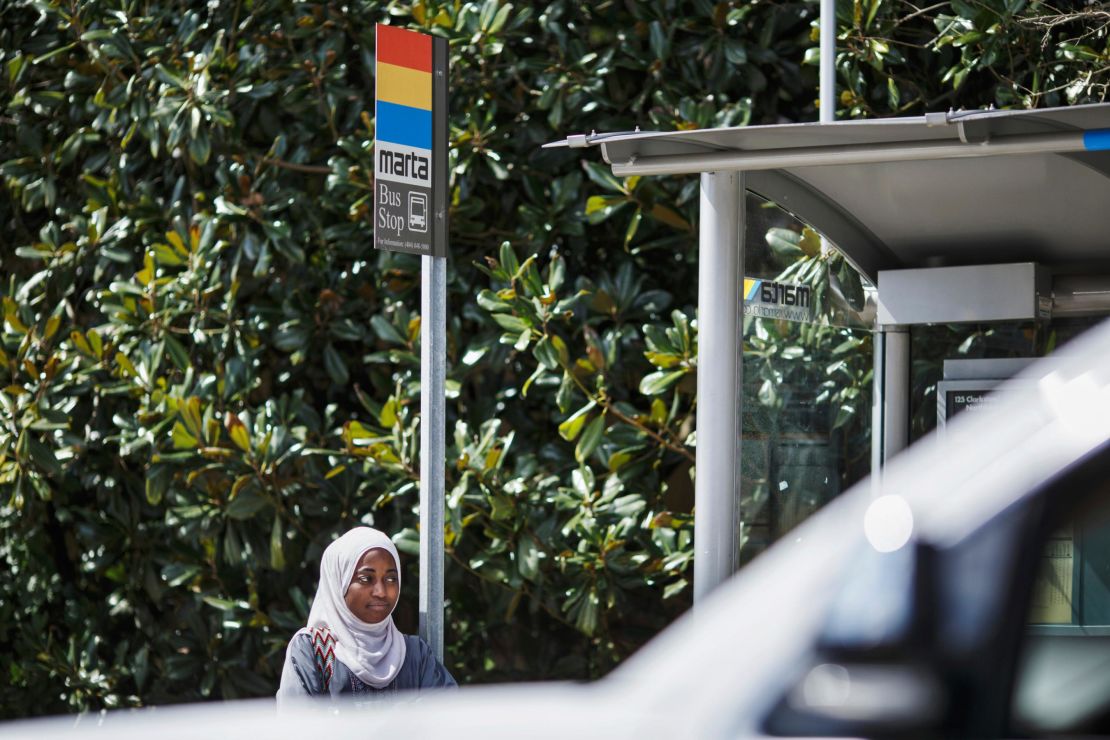
As she waits for the bus, a deflated helium balloon bobs nearby in the wind. Stuffed animals sit in a pile, soggy from a recent rain. They’re part of a makeshift memorial at the apartment complex where her family lives.
A toddler was hit and killed by a car here a few months ago. She was a refugee, and Batulo’s neighbor. The driver who killed her didn’t stop.
Batulo’s mother told her she saw a man driving away from the scene that day. And a lifeless child lying on the ground.
A new routine
Batulo used to walk home alone from the bus stop at night. She doesn’t anymore – not after what happened to her mother.
The first time, Habibo was walking with her children to school. Then it happened again when she was walking alone.
There was a group of men – or maybe boys, Habibo isn’t sure. One time someone threw rocks at her. Another time she thinks someone shouted something about her hijab.
Abdalla reported it to the managers of their apartment complex.
“We don’t know them. We don’t work with them. We didn’t talk even a single day with them,” Abdalla says. “So I don’t know how they can throw stones.”
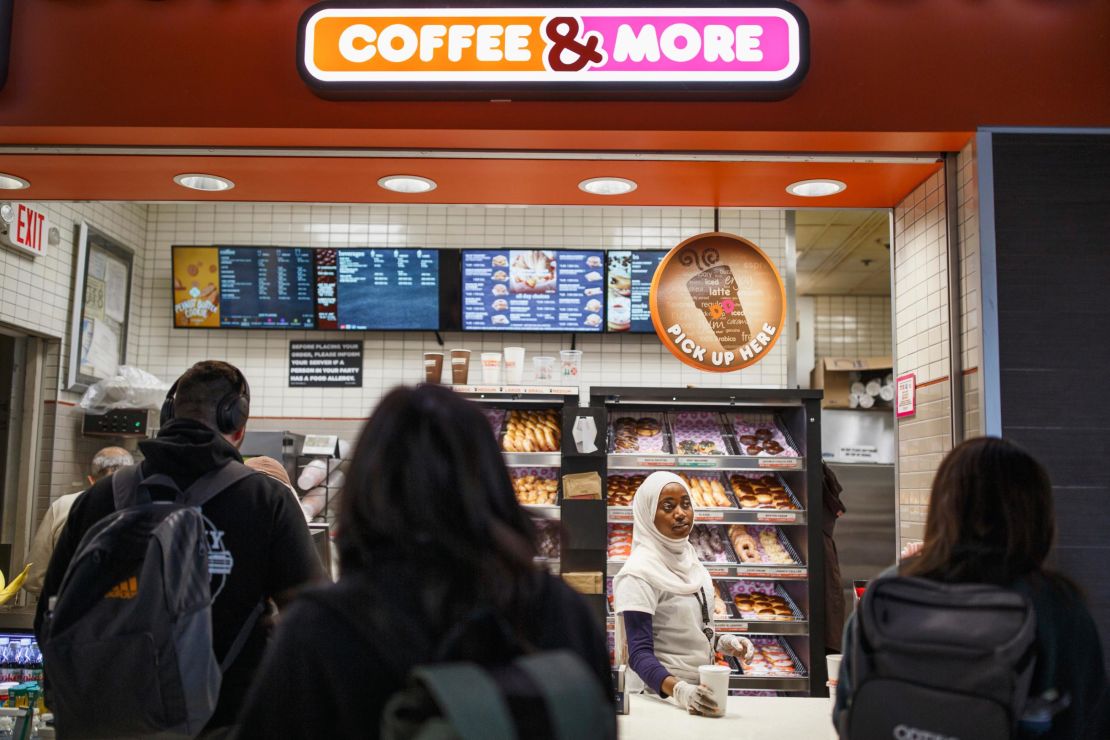
Routines have formed. But they can change.
Batulo stopped heading home alone from the bus stop at night. Now she calls when she’s on the way, and her family walks with her.
Learning her way
Batulo flicks her finger across her cell phone screen as the train rumbles down the tracks.
She’s heading in to another shift at work. It’s a long trek. Four days a week, she takes a bus and two trains to get there. Chats with friends in Kenya help pass the time.
She searches for the perfect pictures to send them as she fires off a string of text messages describing her day.
Her phone is full of photographs. She keeps them to remember each step she takes. She wants to have something to show her children someday.
In one, her mother lies on an exam table in a hospital room. In another, her sister stands in an aisle at Walmart, smiling. Then there’s the photo from a moment that seems so long ago: Batulo is wearing headphones over her hijab and staring into the camera with a forlorn expression. That was the day officials told her she couldn’t travel to the United States.
When she shows that photo to her children, she will tell them what she learned in the painful weeks that followed. Be patient, be strong and take one step at a time. The other steps will follow.
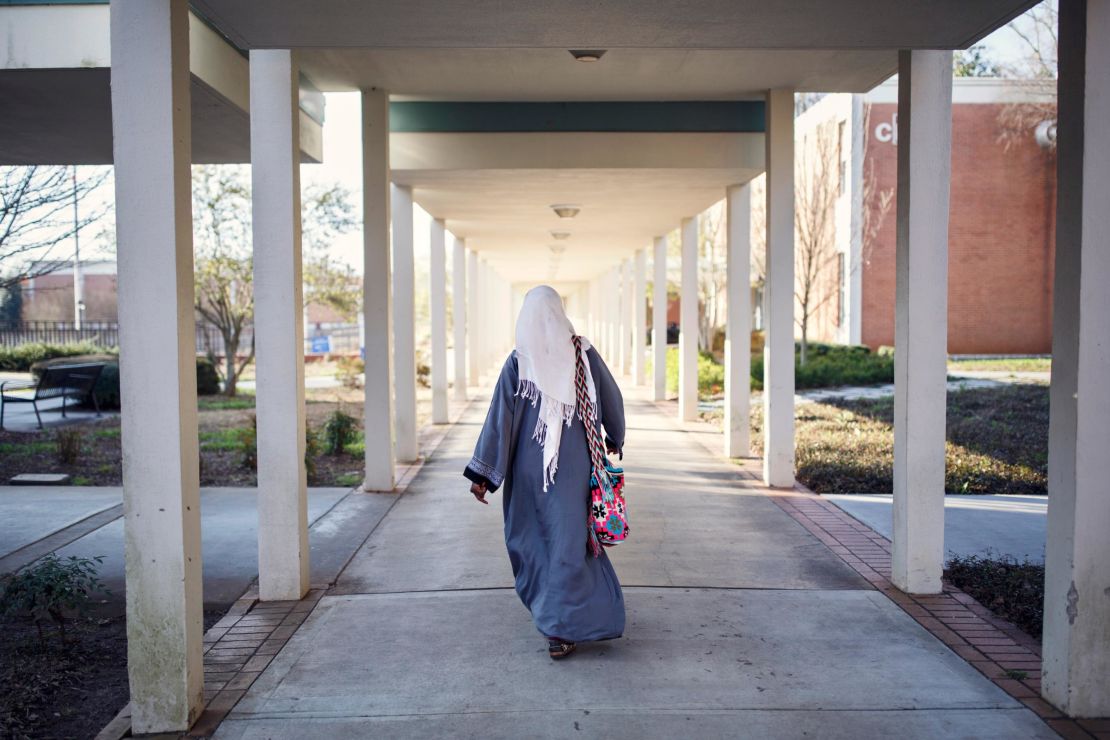
Batulo leans in toward the window. The tall buildings of the Atlanta skyline come into view. It’s a cloudy day, but they still look shiny and bright. Batulo holds her cell phone against the glass and presses record.
Then, one by one, she sends the 15-second video to friends in Kakuma. “Naenda job,” she writes to one friend. On the way to work.
“Umeona kwetu kunavo pendeza,” she says to another. See how lovely our country is.
Batulo doesn’t have her green card yet, but she’s already taken the first step toward getting it.
She’s hoping to get a driver’s license soon, just like her father did, then save up to buy a little red car and drive to North Carolina and Missouri and as many US states as she can. She wants to see what they look like.
She has come so far from that first day. But she still has so far to go.
In a few days, she will see a movie in a theater for the first time.
She is still learning her way around and studying for her GED.
But there is one thing she doesn’t need a map or test-prep packet to teach her.
When one friend asks where she recorded the video, Batulo is swift to reply.
“Kwetu nyumbani,” she says.
Our home.






